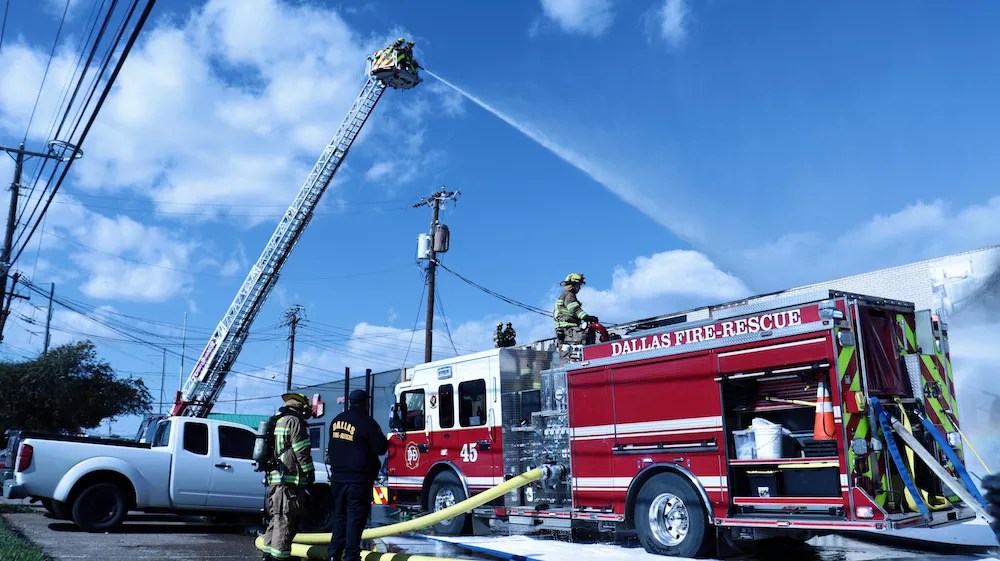
Kurtz Frausun, owner of Studio | Frausun: www.kurtzfrausun.com

Audio By Carbonatix
The Dallas Fire-Rescue (DFR) Department is on fire – figuratively. The local fire department currently boasts quick response times and high ratings despite low staffing.
“We are doing great, and we just seem to be getting better and better,” said Interim Dallas Fire-Rescue Chief Justin Ball.
DFR responds to structural fires within 5 minutes and 20 seconds, or 320 seconds, 92% of the time, says Ball. The National Fire Protection Association establishes a 320-second benchmark goal for fire stations, but many do not reach it. The Houston Fire Department averages 9 minutes and 30 seconds to arrive at a fire. In Austin, fire trucks take as long as 16 minutes to respond to the edges of the city.
“The members of the department are dedicated and really understand the importance of time in regards to emergencies,” Ball said.
Each fire station is scored on how well equipped it is to protect its community. An independent organization, the Insurance Services Office, designates the score based on a number of factors including station locations, water supply and staffing. Scores range from 1 to 10, the lower the score the better.
Seven years ago, DFR received the first Class One rating in the department’s history under the guidance of former chief Dominique Artis, who is now the city’s first Chief of Public Safety. DFR made great efforts to increase the number of fire stations and hydrants since the department was given a Class Two rating in 1999. Now there are 59 stations scattered throughout Dallas and 1,719 first responders.
Still, the department is understaffed and burdened with high overtime costs. The city hopes to have 2,260 total firefighters by the end of September 2025, effectively lowering the amount of overtime. With 215 firefighter trainees on the way, it would seem the goal is well on its way to being achieved. But that’s not quite so.
“For us to take into account attrition and come in on the number, we have to hire a lot more,” said Ball. “So it appears that we have more. But, you know, it takes a long time for them to actually take effect by coming into the field.”
The city’s fire academy program takes 14 months, and high turnover rates create gaps in employment numbers. In August, the Dallas Morning News reported that 44% of the officers expected to be leaving the department this year were quitting after five years or less. The department is actively working on their retention rate with personal approaches that bolster morale among firefighters.
“Since I’ve been in my position, I go, me and a few of us go, to the stations every single week, for the whole afternoon,” Ball said. “And we listen to our members, their concerns, and we communicate directly with them.”
Ball also hand-delivers awards to exemplary firefighters.
“I intend to continue that, going to the stations every week,” he said. “But, you know, we’re 59 stations and three shifts. It’s still going to take a long time to get around to everyone, everywhere.”
This year, DFR was dispatched to 300,000 calls, 7,000 of which were for fires. Stations are dispatching first responders an average of 780 times a day. The department regularly utilizes overtime hours to maintain minimum staffing but it has caught heat for excessive overtime. DFR will wrap up 2024 with just under 55,000 total overtime hours. Last fiscal year, which ended on Sept. 30, the department exceeded the allotted overtime budget by several million dollars. In 2023, one fire and rescue officer made over $184,000 in overtime pay. In 2025, the city plans to curb the added expenditures by reducing the DFR overtime budget.
“The FY 2024-25 budget includes a reduction in overtime by $10.3 million with additional savings of $4.5 million annually expected in future years,” said the city’s latest budget presentation.
But the cut is just one small part of a colossal overall city budget increase to the tune of $5 billion. While the overtime budget was dented, the base salary for firefighters increased to the $70,000 range and the city added 63 firefighters. In addition, the city’s first responder team budget increased by $78 million. The new budget was approved by Interim City Manager Kimberly Bizor Tolbert, who is a strong supporter of the police and fire departments.
“Public Safety has always been a top priority and the City of Dallas has demonstrated that through our FY 2024-25 budget, which includes recruiting and retention incentives,” said Tolbert in an email. “Dallas Fire-Rescue, led by Interim Chief Justin Ball, exemplifies excellence with exceptional performance and innovative programs that set a national standard.”
According to the National Fire Protection Association, the average fire response time in the country is over eight-and-a-half minutes, so DFR is well ahead of the curve.
“The credit is for the firefighters in this department, their selfless commitment and their general concern for the people in this city,” said Ball. “I truly believe we have some of the best firefighters in the nation. I honestly believe that.”